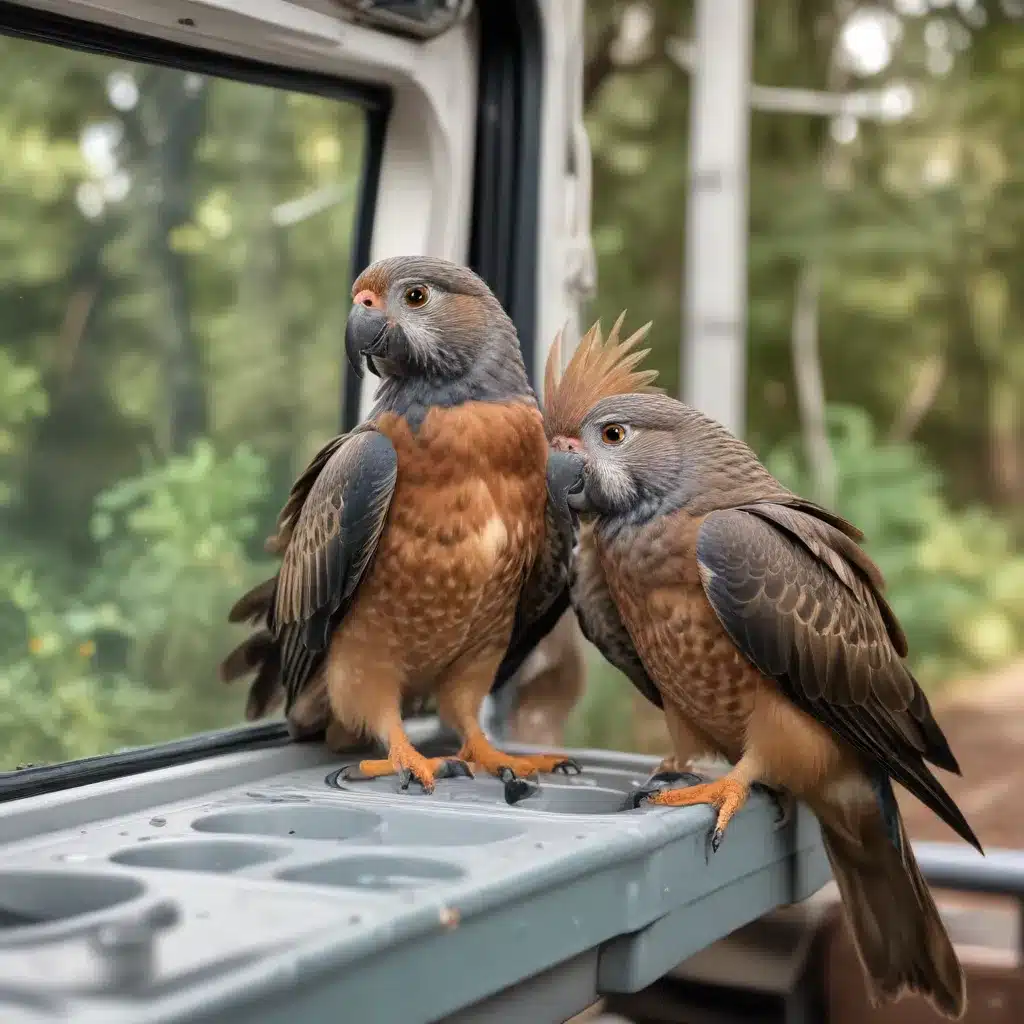
As an experienced avian caretaker, I’ve come to deeply appreciate the joys and challenges of caring for our feathered friends, especially when it comes to providing them with optimal nutrition, even while traveling. Parrots, conures, macaws, and other exotic birds are not just pets – they are lifelong companions that require specialized diets and attentive care to thrive. Whether you’re planning a weekend getaway or an extended vacation, maintaining your avian companion’s nutritional needs on the road is crucial for their health and happiness.
Avian Companions
Avian Species
Avian companions come in a wide variety of shapes, sizes, and species – from the vibrant, playful conure to the majestic macaw. Each type of bird has its own unique dietary requirements and preferences. For example, conures are known to be particularly fond of high-fat, carbohydrate-rich foods, while macaws tend to thrive on a more varied, nutrient-dense diet. Knowing the specific needs of your feathered friend is the first step in ensuring they stay healthy and happy, even when you’re on the move.
Avian Anatomy and Physiology
To properly care for our avian companions, it’s essential to understand their unique anatomy and physiology. Birds have a faster metabolism than mammals, with a higher body temperature and a more efficient digestive system. This means they require a diet that is calorically dense and nutrient-rich to meet their energy demands. Their beaks and digestive tracts are also specialized for processing specific types of foods, so providing the right balance of nutrients is crucial.
Avian Nutritional Requirements
Parrots, conures, and other exotic birds require a carefully balanced diet that includes a variety of fresh fruits, vegetables, proteins, and specialized pellets or formulated feeds. They need a high-quality source of calcium, vitamins, and minerals to maintain strong bones, feathers, and overall health. Deviating from this nutritional plan, even for a short time, can lead to serious health issues, such as malnutrition, vitamin deficiencies, and even reproductive problems.
Traveling with Avian Companions
Travel Considerations
Traveling with an avian companion requires careful planning and preparation. From airline regulations to hotel accommodations, there are numerous factors to consider to ensure your feathered friend’s well-being. Some key considerations include:
- Airline policies: Familiarize yourself with the specific guidelines for transporting your bird, including size restrictions, carrier requirements, and health documentation.
- Ground transportation: Arrange for safe, comfortable travel methods, such as a sturdy, well-ventilated carrier, when moving your bird by car, bus, or train.
- Accommodations: Research pet-friendly hotels, Airbnbs, or other lodging options that can accommodate your avian companion and their needs.
Avian-Friendly Accommodations
When selecting accommodations for your travels, look for options that are specifically designed or prepared to welcome avian companions. These may include hotels with designated “bird rooms” or Airbnb listings that advertise bird-friendly amenities. Ensure that the space is safe, secure, and free from potential hazards, such as open windows, ceiling fans, or exposed electrical cords.
In-Transit Care
Maintaining your bird’s routine and providing them with familiar comforts during transit is crucial for their well-being. Pack their favorite toys, perches, and even a portion of their regular bedding to help them feel at ease. Additionally, be prepared to offer small, frequent meals and water to keep them hydrated and nourished throughout the journey.
Avian Nutrition
Nutrient Composition
Crafting a balanced, nutrient-rich diet for your avian companion is essential, whether you’re at home or on the road. Their diet should be composed of high-quality pellets or formulated feeds, supplemented with a variety of fresh fruits, vegetables, and protein sources. Avoid processed, high-fat, or high-sugar human foods, as these can be detrimental to your bird’s health.
Dietary Supplements
In addition to a well-rounded base diet, your bird may also benefit from targeted dietary supplements, especially when traveling. Look for supplements that provide extra calcium, vitamins, and minerals to support their immune system, feather health, and overall wellbeing. Be sure to consult with an avian veterinarian to determine the appropriate supplementation for your specific bird.
Feeding Schedules
Maintaining a consistent feeding schedule is crucial for your bird’s digestive health and overall well-being. When traveling, try to adhere to their regular mealtimes as closely as possible, offering small, frequent meals to keep their energy levels stable. This may require packing pre-portioned meals or having a plan to acquire fresh, bird-safe ingredients at your destination.
Health and Wellbeing
Stress Management
Traveling can be a stressful experience for our avian companions, and it’s essential to take steps to minimize their anxiety. Provide a comfortable, familiar carrier or cage, and consider using calming supplements or pheromone-based products to help soothe your bird. Additionally, be mindful of environmental factors, such as loud noises or sudden movements, that may trigger stress responses.
Veterinary Considerations
Before embarking on any trip, it’s crucial to consult with your avian veterinarian. They can provide guidance on travel-specific health concerns, recommend any necessary medications or preventative care, and ensure your bird is in optimal condition for the journey. If your travel plans include crossing state or international borders, be sure to have the appropriate health certificates and documentation on hand.
Preventative Care
Maintaining your bird’s preventative care regimen, even while traveling, is essential for their long-term health and wellbeing. This may include administering regular parasite treatments, ensuring their vaccinations are up-to-date, and monitoring for any signs of illness or distress. By being proactive with your bird’s care, you can help minimize the risk of health issues while on the go.
Caring for our avian companions is a rewarding and fulfilling experience, but it also comes with a great responsibility. By understanding the unique nutritional needs of your feathered friend and taking the necessary precautions when traveling, you can ensure they remain happy, healthy, and thriving, no matter where your adventures may take you. With the right preparation and a commitment to their wellbeing, you and your avian companion can embark on countless adventures together.


